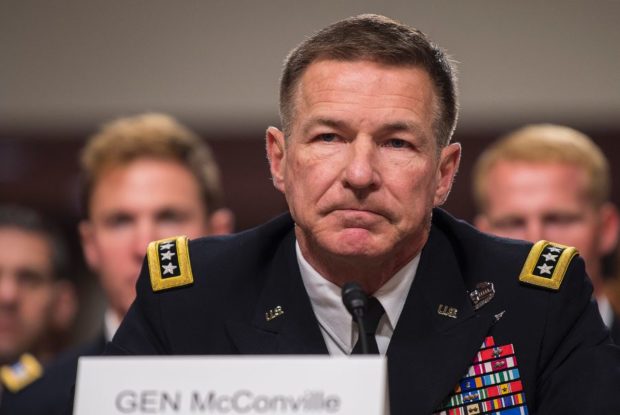Army Chief of Staff Nominee Substitutes Gut Instinct About Transgender Troops for Data
It became clear yesterday that Army leadership intends to backfill hypothetical justifications for DOD’s new transgender ban without evidence, following in the footsteps of former Secretary of Defense James Mattis, who did the same thing in an effort to “fix” President Trump’s tweeted ban.
General James McConville is the nominee to become the next Chief of Staff of the Army. Yesterday he submitted written answers to the Senate Armed Services Committee, and what he had to say about his transgender soldiers was illuminating. The central question and answer:
196. In your experience, has the service of transgender individuals in their preferred gender had any negative impacts on unit or overall readiness in the Army?
McConville’s answer: In my experience, a Service member with a medical condition who has been non-deployable for multiple periods of significant duration could negatively impact readiness – especially in a high-demand, low-density MOS. Non-deployable Soldiers can negatively impact a unit’s force readiness, especially smaller units or in highly specialized areas with a very small population.
Take note of the hypothetical, evidence-free framework. A hypothetical service member “who has been non-deployable for multiple periods of significant duration could negatively impact readiness.” Yes, everyone agrees that “could” happen and, if it did, everyone agrees that lack of availability for duty could impact readiness.
But McConville never answered the question that was asked. Have transgender troops actually had a negative impact? McConville doesn’t say, and it’s fair to assume he would have offered evidence if he had any. We do know that McConville’s predecessor, General Mark Milley, told Congress there were “precisely zero reports of issues of cohesion, discipline, morale and all those sorts of things” as a result of open transgender service.
We also know from official DOD data (that the Pentagon did not disclose in the Mattis report’s discussion of hypothetical deployment risks, but retired chiefs of military medicine studied independently), that out of 393 service members with gender dysphoria who have deployed to the Middle East, only one was sent home for mental health reasons after July 1, 2016, when being transgender was no longer cause for discharge.
McConville is obviously aware of DOD policy that requires all members of the military, transgender or not, to meet the universal deployment standards established by DOD Instruction 1332.45. All the new transgender ban accomplishes is the disqualification of troops who would otherwise meet the standards that apply to everyone else.
But this is the same “it could happen” method that former Defense Secretary Mattis used to justify the president’s tweets after-the-fact. The Mattis report was littered with speculation about what “could” or “might” happen if transgender people were allowed to serve in accord with gender identity. (Anything but what actually “did” happen.)
Congress deserves better than unsupported speculation, without evidence, about people who serve their country in uniform. We all do.
